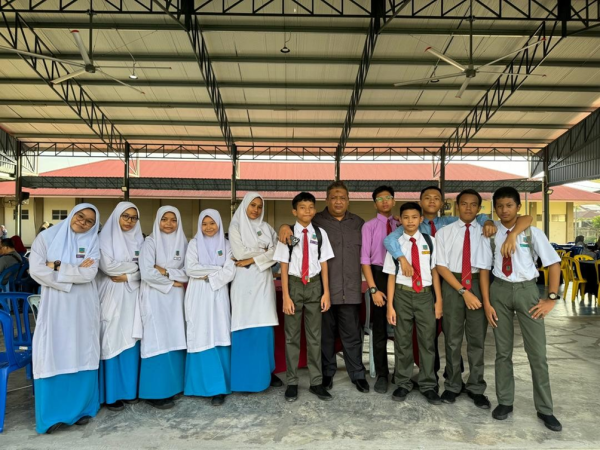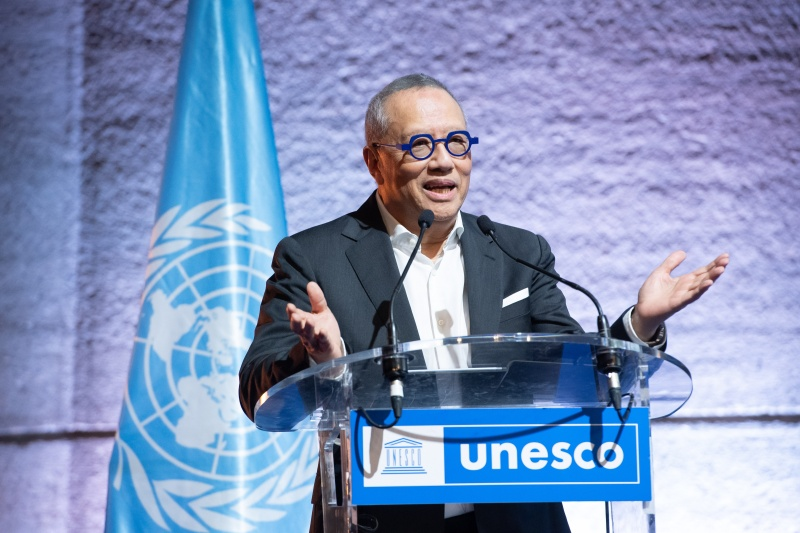Paris, France, Sept. 05, 2025 (GLOBE NEWSWIRE) — NetDragon Websoft Holdings Limited (“NetDragon” or the “Company”; Hong Kong Stock Code: 777), a global leader in building internet communities, was invited to participate in UNESCO’s Digital Learning Week, held from September 2–5 at UNESCO Headquarters in Paris, under the theme “AI and the Future of Education”.
NetDragon was featured at key events including the opening ceremony and parallel forums. As the only corporate invitee, it joined over 30 education ministers and senior officials from the UK, India, Thailand, Malaysia, Türkiye, the UAE and other nations at the Ministerial Roundtable.
Dr. Simon Leung, Vice Chairman of NetDragon, emphasized in his address at the opening ceremony that the future of education must be a collaboration that transcends academic boundaries and national frontiers, enabled by technology.
During the event, NetDragon showcased a range of its AI education capabilities and products and also explained why Open-Quest Academy (“Open-Q”) chose to partner with NetDragon. Among the featured innovations were the interactive AI digital human, the Promethean ActivPanel 10 interactive panel, the ROKID AR immersive learning experience, and the “E-Library for Teachers”. The demonstrations drew global attention and garnered acclaim from international attendees.

Addressing Global Content Creation Challenges
Since the resurgence of large language models (LLMs) in 2023, AI has been a key driver in the acceleration of digital education worldwide. Dr. Leung underscored the transformative role of AI in education at the event.
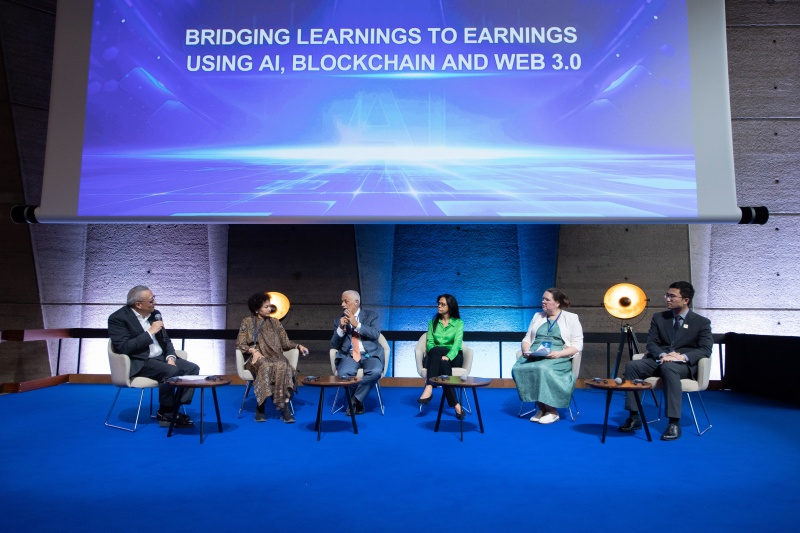
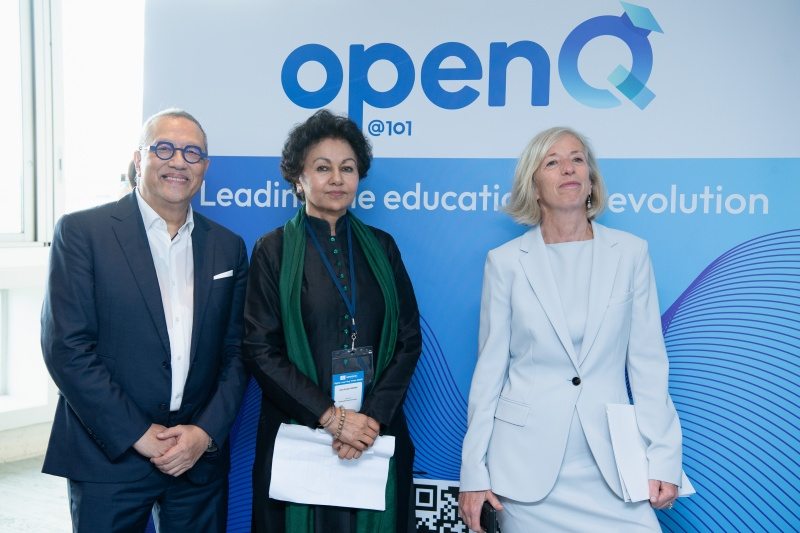
The global education community continues to grapple with significant challenges, including the shortage and uneven distribution of education resources, as well as the excessive concentration of content within limited regions and languages. During the pandemic, over 500 million students lacked remote learning access, 72% of whom were in underserved regions. Meanwhile, 90% of open educational resources originate from Western countries, with the majority dominated by English.
To address these gaps, NetDragon created the AI Content Factory–a scalable, cost-efficient platform for culturally adaptive content production. By transforming educators’ tacit knowledge into structured data and enabling intelligent multi-agent collaboration across the content creation lifecycle, the AI Content Factory creates a self-improving system that combines human oversight with scalable AI-driven production. Its dual-cycle quality control mechanism integrates real-time teacher feedback and expert reviews, ensuring both accuracy and continuous improvement.
A prime example is the AI Education Platform launched in partnership with Thailand’s Ministry of Higher Education, Science, Research and Innovation (MHESI) in May 2025. The platform provides AI-powered vocational training to students and young people across Thailand, aligning with the nation’s “Education 6.0” strategy while supporting growth in high-potential fields like AI, electric vehicles, and semiconductors. Beyond Thailand, with support from the World Bank, NetDragon is also advancing digital school transformation in countries including Cameroon. Going forward, the company will continue to leverage the AI Content Factory to deliver highly customized education solutions worldwide.
Partnership with Open-Q
NetDragon, together with the attending guests, witnessed the launch of Open-Q. Open-Q is an open, future-oriented education ecosystem. With education hubs and content creation centers worldwide, Open-Q brings together experts, teachers, and practitioners to collaborate on metaverse-based learning and teaching platforms. Anchored in its three core principles—technology for equity, co-creation of resources, and incentive-driven participation—Open-Q delivers high-quality, localized digital content to advance equitable and effective education worldwide.
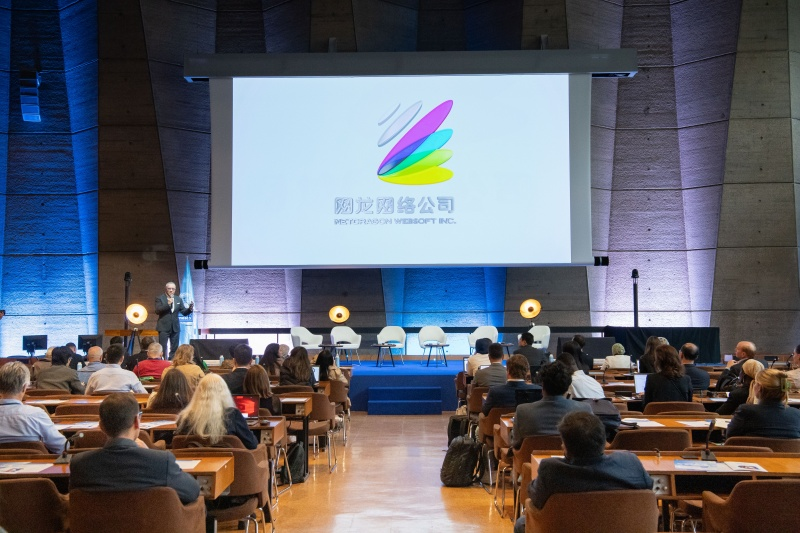
Data shows that the unemployment rate among bachelor’s degree holders aged 20–24 has risen by 29% over the past four to five years. In certain fields, such as IT and computer engineering, the rate has surged more than 100% compared with 2018–2019. Amid this challenge, Open-Q is harnessing the power of AI to provide new opportunities and guidance for the future. A core feature of Open-Q is its “Learn-and-Earn” model, a learning community where learners acquire job-ready skills, educators are rewarded for high-quality contributions, and the entire ecosystem benefits from an expanding shared knowledge base.
The decision to partner with NetDragon is grounded in the Company’s demonstrated expertise in platform development, proven through multiple country-level initiatives. The Company’s collaborative history with UNESCO-affiliated institutions further solidified this partnership. In 2021, NetDragon jointly launched the “E-Library for Teachers” with UNESCO IITE—a platform that now supports more than 100,000 educators worldwide, demonstrating NetDragon’s sustained commitment to promoting educational equity through technology.
Looking ahead, NetDragon will leverage its AI Content Factory as a core AI engine to deepen collaborations with UNESCO, national governments, leading global universities, and corporations. Together, they aim to create an educational ecosystem that transcends academic boundaries and national borders—accelerating the vision of a future where everyone can learn anywhere, anytime.
–End–
About NetDragon Websoft Holdings Limited
NetDragon Websoft Holdings Limited (HKSE: 777) is a global leader in building internet communities, with a long track record of developing and scaling multiple internet and mobile platforms that impact hundreds of millions of users. Over the desktop and mobile internet eras, NetDragon previously established China’s first online gaming portal, 17173.com, and China’s most influential smartphone app store platform, 91 Wireless.
Established in 1999, NetDragon is one of the most reputable and well-known online game developers in China with a history of successful game titles including Eudemons Online, Conquer Online, Heroes Evolved and Under Oath. In the past 10 years, NetDragon has also achieved success with its EdTech business both domestically and globally. Fully embracing the new AI era, NetDragon is driving its vision of “Infinite Growth” through a dual-focus strategy of “AI+Gaming” and “AI+Education”. With its AI Content Factory empowering operations and working with partners to develop a global learning metaverse, NetDragon is committed to once again building a massive user community in the new AI era.
NetDragon’s overseas edtech business entity, currently a U.S.-listed subsidiary named Mynd.ai, is a global leader in interactive technology and its award-winning interactive displays and software can be found in more than 1 million learning and training spaces across 126 countries.
https://www.youtube.com/watch?v=jghxm1p056M


